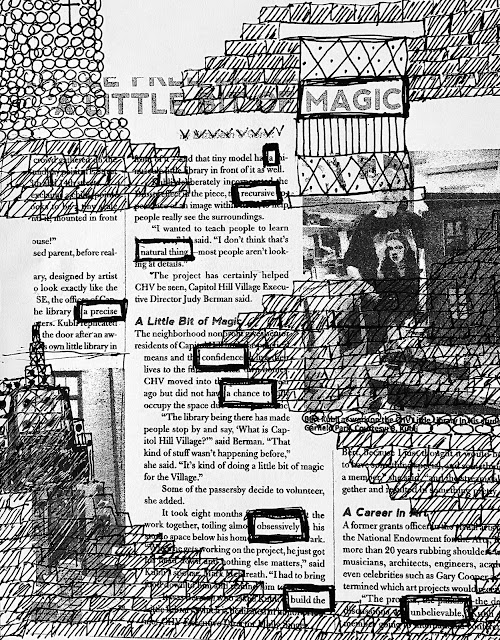Have you heard of Zentangles? I had not, before this challenge. It's a form of meditative drawing, explained better here.
It's also, I learned, a way to enhance a found poem. (A found poem is one drawn from words "found" in existing texts.) The idea is to use Zentangle patterns to block out unneeded words, and also, to accentuate the shape and flow of the poem itself. Here's a lovely explanation and several examples.
Well, readers, I did not exactly "un-tangle" my thoughts about this challenge before I Zoomed with my Poetry Sisters, so I had questions. LOTS of questions. And fears. Found poetry, while fun, is frustrating because while you can select your words, you cannot re-order them. Worse, I'm not great with precise patterns or lines or drawing in general. The idea of using large sections of small marks to block out most of a perfectly good page was frightening. Plus, working in pen---so no going back!
But, like most things, She Who Whines the Loudest...Falls the Hardest, and I wound up loving this challenge, once I made it my own. I gave myself the grace of working on multiple copies of a piece of text until I was more sure of the words I picked. I learned that I didn't have to cover every inch of a page, nor did I have to use established patterns. I could make my poems Zen-tangle-ISH.
In the end, I created three poems in two days. I'll share them in the order I created them.
First, a poem I created from a text in Michael Sims' book, Adam's Navel, A Natural and Cultural History of the Human Form. I chose this text for its juicy words (too juicy, it turns out, because I kept being distracted by sentences like "The tongue is seldom noteworthy in birds, but the flamingo is cursed with one so muscularly tasty that Roman emperors served them by the bowlful." Yeah, try competing with THAT.)
Anyway, I found a poem fairly easily, but was unhappy with my initial attempt to connect the words with lines. I wound up finding a better answer in one of the found words: encodes. What if I simply encoded (or over-coded?) the rest of the text in a binary "ones and zeros" pattern?
Language encodes
a diverse sweetness
providing the throat
chocolate
and peaches
----Sara Lewis Holmes (all rights reserved)
Not bad. I liked the poem. The drawing---eh. Not much. I tried again. This time, I used a page from a Food52 catalog, and I left most of the underlying text intact, using graphics to show the reader how to read it.
A well-balanced summer:
Start with sun.
Add wild flowers.
When in doubt,
bring friends...
and read.
----Sara Lewis Holmes (all rights reserved)
Better. And as a bonus, I discovered a trick of word selection. I didn't have to select an entire word; I could truncate it. In that last line, "read" was "bread." I also liked how the poem and the visuals and underlying text interacted. (Relating the background text to the found poem is not part of the challenge, but I liked the extra layer. You could even create a poem that strongly contrasts with your background text---a poem about peace taken from a war declaration, for example.)
Finally, I created a third poem from an article in the Hill Rag (a local paper here in DC.) The text was about a Little Free Library, something I plan to put out front of our house now that we've stopped moving and I can tend it. Capitol Hill is home to many Little Free Libraries (and even one Little Free Art Gallery) and they fascinate me---the unique designs and the people who dig through them, and often, the quotes that the owners will affix to the side. Truly, they are small wonders.
However, my poem turned out to be about something more elusive: the magic of making things.
You'll probably have to zoom in to read the poem as the original text was quite small and printed on newspaper.
MAGIC
a recursive
natural thing
a precise
confidence
a chance to
obsessively build
the unbelievable.
-----Sara Lewis Holmes (all rights reserved)
Maybe I overdid it on the bricks (we recently had the bricks in our 1880s house repointed so I'm hyper-aware of their shapes) ....or maybe I didn't go far enough....could I cover more of the page to make the words of the poem stand out? Perhaps it doesn't matter because I loved making this one. It felt meditative. Zen-ish. As if my mind un-tangled for a brief time. Magic.
See how my Poetry Sisters tangled this challenge below (a few of us are taking a break)
Liz
Laura
Kelly
Poetry Friday is hosted today by
Linda Mitchell at A Word Edgewise. (BONUS: Linda is offering a fun "Clunker Exchange" where you can exchange one of your poetry lines for one of hers.)










